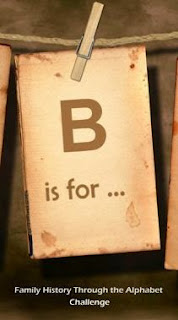Delayed, but
dutifully presented, here is the next of my posts for the Gould "Family History Through the Alphabet" Challenge
Doris is from the ancient
Greek name (Doris) which meant "Dorian woman".
The Dorians were a Greek tribe who occupied the Peloponnese starting in the
12th century BC. In Greek mythology Doris was a
sea nymph, one of the many children of Oceanus and Tethys. It began to be used
as an English name in the 19th century.
Source: Behind the Name.
Doris Louisa Morgan was my wonderful Grandmother. She
was born in Balmain, an inner suburb of Sydney in 1903 and died in 1988. She
was affectionately known as “Dorrie”, but is sorely done by in the publication “Maroubra
and District Pioneer Register Pre 1945” published by the Cape Banks Family History Society.
This Pioneer index was compiled from individual submissions without any proof
being needed, so different people who knew my family have entered Nana as being
named both “Dorothy” and “Dorrie”; did no one known that her name was Doris? There
are so mistakes in this publication regarding my family that I would blush if I
were an editor, or had anything to do with its publication. A publication for
family history researchers that contains unverified information is next to
useless, in my humble opinion.
Doris met her husband Arthur Roberts at a dance held at
Anderson’s Hall in the then popular weekend destination of “Long Bay”. They married
in 1926, and had three daughters. Nana was a very “traditional” woman, spending
her time making jam, bottling the fruit and vegetables that were grown in her
backyard; the washing was always done on a Monday – first boiled in a copper,
then put through the wringer to be rinsed in clean water in the cement troughs
and least three times, with a “blue bag” to whiten the whites. Doris had to be
pulled kicking and screaming into the technological age of the latter half of
the 20th century; no need for a mechanical washing machine or an
electric refrigerator in her opinion – no her “Ice Chest” would do just fine.
And Television, what a waste of time – she had the “wireless” to listen to!
Nana was always “smart” though in public; going to
dances regularly almost up until the time her husband died. Her hair “curled”,
her best dress and a hat – types of which are often to be found in “Vintage”
shops these days, all topped off with her fox fur – Very nice!
But Nana had another side; she could rough it with
the best. The family regularly went camping down the South Coast of NSW. They
spent their time sailing, fishing and finding oysters, living on the back of
her husband’s truck. Nana was also a strong believer that “Stout” (the alcoholic
beverage) was beneficial for any and all ills.
 |
| Doris Morgan (R) with her friend Nellie (L), holidaying on the South Coast of NSW |
 I don’t have many mementoes of my Nana, living in a
different State meant that her belongings were well and truly picked over by
other family members. I know that Nana had promised each Grandchild a special
thing that they had liked as a child, but few of us were given what had been
promised. She also had put away a “Florin” - a coin worth 2 shillings (equivalent
to 20 cents) from the year of our birth; it may not seem much now, but was a
fortune to us kids back then and I’m not sure any of her grandchildren saw them
either. What I am more than grateful for though is the many wonderful memories
of eating her bread and jam, her wonderful humour and presence; her love and
devotion as well as all the crotched hankies and coat hanger covers that I received
as Christmas presents without fail each year, and which I still have and use,
and most importantly, the stash of photographs that my mother was able to
secrete away and which are now in my possession to remind me always of my
wonderful Nana – Doris.
I don’t have many mementoes of my Nana, living in a
different State meant that her belongings were well and truly picked over by
other family members. I know that Nana had promised each Grandchild a special
thing that they had liked as a child, but few of us were given what had been
promised. She also had put away a “Florin” - a coin worth 2 shillings (equivalent
to 20 cents) from the year of our birth; it may not seem much now, but was a
fortune to us kids back then and I’m not sure any of her grandchildren saw them
either. What I am more than grateful for though is the many wonderful memories
of eating her bread and jam, her wonderful humour and presence; her love and
devotion as well as all the crotched hankies and coat hanger covers that I received
as Christmas presents without fail each year, and which I still have and use,
and most importantly, the stash of photographs that my mother was able to
secrete away and which are now in my possession to remind me always of my
wonderful Nana – Doris.








